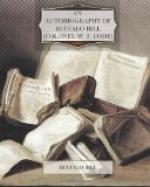In June, 1856, when I was ten years old, father went to the Fort to collect his pay for hay and wood he had sold there. I accompanied him on my pony. On our return we saw a crowd of drunken horsemen in front of Riveley’s trading-post—as stores were called on the frontier. There were many men in the crowd and they were all drunk, yelling and shooting their pistols in the air. They caught sight of us immediately and a few of them advanced toward us as we rode up. Father expected trouble, but he was not a man to turn back. We rode quietly up to them, and were about to continue on past when one of them yelled:
“There’s that abolition cuss now. Git him up here and make him declar’ hisself!”
“Git off that hoss, Cody!” shouted another.
By this time more than a dozen men were crowding about father, cursing and abusing him. Soon they tore him from his horse. One of them rolled a drygoods box from the store.
“Now,” he said, “git up on that thar box, and tell us whar’ ye stand.”
Standing on the box, father looked at the ringleaders with no sign of fear.
“I am not ashamed of my views,” he said, quietly. “I am not an Abolitionist, and never have been. I think it is better to let slavery alone in the States where it is now. But I am not at all afraid to tell you that I am opposed to its extension, and that I believe that it should be kept out of Kansas.”
His speech was followed by a wild yell of derision. Men began crowding around him, cursing and shaking their fists. One of them, whom I recognized as Charlie Dunn, an employee of my Uncle Elijah, worked his way through the crowd, and jumped up on the box directly behind father. I saw the gleam of a knife. The next instant, without a groan, father fell forward stabbed in the back. Somehow I got off my pony and ran to his assistance, catching him as he fell. His weight overbore me but I eased him as he came to the ground.
Dunn was still standing, knife in hand, seeking a chance for another thrust.
“Look out, ye’ll stab the kid!” somebody yelled. Another man, with a vestige of decency, restrained the murderer. Riveley came out of the store. There was a little breaking up of the crowd. Dunn was got away. What happened to him later I shall tell you in another chapter.




